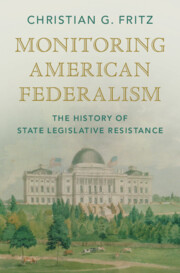Book contents
- Monitoring American Federalism
- Studies in Legal History
- Monitoring American Federalism
- Copyright page
- Dedication
- Contents
- Acknowledgments
- Introduction
- 1 The Riddle of Federalism and the Genesis of Interposition
- 2 Early State Use of Interposition: Testing the Powers of the New National Government
- 3 State Interposition and Debates over the Meaning of the Constitution
- 4 The Virginia and Kentucky Resolutions and Madison’s Report of 1800
- 5 State Interposition during the Jefferson and Madison Presidencies
- 6 State Challenges to the Supreme Court’s Control over Constitutional Interpretation
- 7 The Transformation of Interposition: The Theory of Nullification Emerges
- 8 State Interposition and Nullification on the Path to Secession
- 9 State Interposition during and after the Civil War
- 10 Modern Interposition by States and “Nullification”
- Abbreviations
- Notes
- Selected Short Titles
- Index
1 - The Riddle of Federalism and the Genesis of Interposition
Published online by Cambridge University Press: 05 January 2023
- Monitoring American Federalism
- Studies in Legal History
- Monitoring American Federalism
- Copyright page
- Dedication
- Contents
- Acknowledgments
- Introduction
- 1 The Riddle of Federalism and the Genesis of Interposition
- 2 Early State Use of Interposition: Testing the Powers of the New National Government
- 3 State Interposition and Debates over the Meaning of the Constitution
- 4 The Virginia and Kentucky Resolutions and Madison’s Report of 1800
- 5 State Interposition during the Jefferson and Madison Presidencies
- 6 State Challenges to the Supreme Court’s Control over Constitutional Interpretation
- 7 The Transformation of Interposition: The Theory of Nullification Emerges
- 8 State Interposition and Nullification on the Path to Secession
- 9 State Interposition during and after the Civil War
- 10 Modern Interposition by States and “Nullification”
- Abbreviations
- Notes
- Selected Short Titles
- Index
Summary
One key feature of the Constitution – the concept of federalism – was unclear when it was introduced, and threatened the Constitution’s ratification by those who feared the new government would undermine state sovereignty. In their famous essays in The Federalist, Alexander Hamilton and James Madison defended the Constitution and argued that state legislatures would sound the alarm if the national government exceeded its authority. They argued that through interposition state legislatures would effectively check the national government by mobilizing resistance should the government try to overreach. Resolutions passed by legislators could legitimately be considered an expression of the people that could then be shared with the state’s congressional delegation and other state legislatures. Hamilton’s and Madison’s advocacy for state legislatures as monitors of the equilibrium of the two levels of government under the Constitution was a rhetorical argument designed to address the objections of Anti-Federalists. At the time of the ratification debates, both men were deeply distrustful of state legislatures, yet needed to explain how the national government would not overwhelm the states.
Keywords
- Type
- Chapter
- Information
- Monitoring American FederalismThe History of State Legislative Resistance, pp. 11 - 38Publisher: Cambridge University PressPrint publication year: 2023



